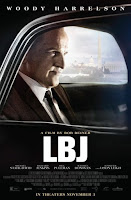That distance shows one of the film’s biggest problems:
neither director/producer Rob Reiner nor actor Woody Harrelson likes LBJ the
least. Both Harrelson and Reiner later said they disliked LBJ because he was
pro-Vietnam. Now the question is: why make a movie about him?
DM Bradley said in his review, “Although Woody (before
he was in War For The Planet Of The Apes, Three Billboards…, Solo: A Star Wars
Story and several others) is actually about the same age as LBJ was during the
years depicted here, he nevertheless sat for hours in the make-up chair and
wore prosthetics to make his lean gob look more like the jowly Johnson’s, and
all it really does is make him look weirdly rubbery.”
Strangely focusing more on Johnson’s Vice Presidency
than his actual Presidency, this starts with LBJ, his wife Lady Bird (Jennifer
Jason Leigh), and John F. Kennedy (Jeffrey Donovan) and his wife Jackie (Kim
Allen) in Dallas on November 22, 1963. Bradley noted, “We know the
assassination is coming, yet there isn’t much tension (as there was in Jackie,
where LBJ was impressively played by the less chameleonic John Carroll Lynch)
and the sequence looks a little cheap, with sparse crowds and, briefly, a
reflection of the camera crew in one of the cars.”
We jump back and forth from that tragic day as Joey
Hartstone’s script continues, and early on there’s a hint that LBJ was very
jealous of the more popular JFK and secretly regretted how he only became
President after Kennedy was assassinated. Bradley said, “Later LBJ is also seen
having it out with Bobby Kennedy (Michael Stahl-David not really looking much
like the real guy), who refuses to like him, in sequences that have been
stripped of their dirtier excesses. Here you wonder again why anyone would
bother making a movie about Johnson if he couldn’t be depicted in all his
foul-mouthed glory.”
Stronger in tone are the scenes where Johnson is
becoming more faithful to civil rights causes and must fight with evil Senator
Richard Russell, played by Richard Jenkins, playing against type. The two of
them have dinners and meetings where Russell tells his fear at the fact of
allowing black people any type of equality in the South, and that’s the way God
would want it too. Harrelson’s LBJ sits there looking quietly shocked.
Bradley said, “Made at a time when LBJ has featured in
several films, this is handled by director Rob Reiner with creaky earnestness,
and Harrelson is strained, especially when he tries to be awkwardly funny. Why
do it at all? The final act shows that LBJ did great things in the realms of
social justice, and this sings his praises in the standard final credit crawl
too, before noting that, yes indeed, his belief in the Vietnam War was his
undoing.” All the way, you might say.
I have mixed feelings about this film. I don’t like
that it jumped back and forth between the life of LBJ’s career and there wasn’t
much of a focus here. It only got focused after LBJ became president. If you
want to watch this, you can see it on Roku, but I don’t recommend this. This is
just an average movie, not a good or bad one.
Happy President’s Day everyone. Look out Friday for
the continuation of “Black History Movie Month.”

No comments:
Post a Comment